Related Research Articles

Earl Peel is a title in the Peerage of the United Kingdom. The Peel family descends from Robert Peel, eldest son of a wealthy cotton merchant. The family lands, known as Drayton Manor, in the County of Stafford would become more commonly known in modern-day as an amusement park. The family seat is Elmire House, near Ripon, North Yorkshire.
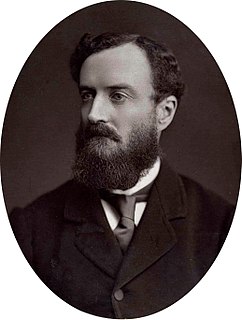
Earl St Aldwyn, of Coln St Aldwyn in the County of Gloucester, is a title in the Peerage of the United Kingdom. It was created in 1915 for the prominent Conservative politician Michael Hicks Beach, 1st Viscount St Aldwyn, known from 1854 to 1907 as Sir Michael Hicks Beach, 9th Baronet, of Beverston. He was Chancellor of the Exchequer from 1885 to 1886 and again from 1895 to 1902. Hicks Beach had already been created Viscount St Aldwyn, of Coln St Aldwyn in the County of Gloucester, in 1906, and was made Viscount Quenington, of Quenington in the County of Gloucester, at the same time he was given the earldom. Both titles are in the Peerage of the United Kingdom. He was succeeded by his grandson, the second Earl, the son of Michael Hicks Beach, Viscount Quenington, Member of Parliament for Tewkesbury, who was killed in action in 1916. Lord St Aldwyn was also a Conservative politician and was Captain of the Honourable Corps of Gentlemen-at-Arms between 1958 and 1964 and 1970 and 1974. As of 2018 the titles are held by his eldest son, the third Earl, who succeeded in 1992.

Viscount Ridley is a title in the Peerage of the United Kingdom. It was created in 1900 for the Conservative politician Sir Matthew White Ridley, 5th Baronet, Home Secretary from 1895 to 1900. He was made Baron Wensleydale, of Blagdon and Blyth in the County of Northumberland, at the same time, also in the Peerage of the United Kingdom. The latter title was a revival of the barony held by his maternal grandfather James Parke, Baron Wensleydale, whose title became extinct upon his death since none of his sons survived him.
Baron Ravensworth, of Ravensworth Castle in the County Palatine of Durham and of Eslington Park in the County of Northumberland, is a title in the Peerage of the United Kingdom.

Baron Glentoran, of Ballyalloly in the County of Down, is a title in the Peerage of the United Kingdom. It was created on 8 July 1939 for the Unionist politician Herbert Dixon. In 1950 he also succeeded his elder brother as third Baronet, of Ballymenock. His son, the second Baron, was also a politician and served as the last Speaker of the Senate of Northern Ireland. As of 2017 the titles are held by the latter's son, the third Baron, who succeeded in 1995. He is a former Olympic Bobsleigh gold medallist as well as a soldier, businessman and politician. Lord Glentoran was one of the ninety elected hereditary peers who remain in the House of Lords after the passing of the House of Lords Act of 1999, and sat on the Conservative benches until his June 2018 retirement under the House of Lords Reform Act 2014.
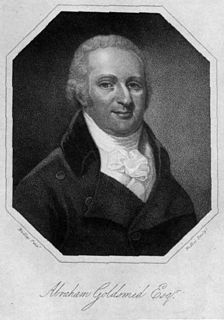
Goldsmid is the name of a family of Anglo-Jewish bankers who sprang from Aaron Goldsmid, a Dutch merchant who settled in England about 1763. Two of his sons, Benjamin Goldsmid and Abraham Goldsmid, began business together about 1777 as bill-brokers in London, and soon became great powers in the money market, during the Napoleonic war, through their dealings with the government. Abraham Goldsmid was in 1810 joint contractor with the Barings for a government loan, but owing to a depreciation of the scrip he was forced into bankruptcy and committed suicide. His brother, in a fit of depression, had similarly taken his own life two years before. Both were noted for their public and private generosity, and both played major roles in funding, and managing the Naval Asylum - later renamed the Royal Naval Asylum. Benjamin left four sons, the youngest being Lionel Prager Goldsmid; Abraham a daughter, Isabel.
Major-General Sir James Arthur "Jack" d'Avigdor-Goldsmid, 3rd Baronet, was a British Army officer and British Conservative politician. He was a member of the prominent Anglo-Jewish d'Avigdor-Goldsmid family, and his brother Sir Henry d'Avigdor-Goldsmid, 2nd Baronet was also a Member of Parliament.
There have been three baronetcies created for persons with the surname Baillie, one in the Baronetage of Nova Scotia and two in the Baronetage of the United Kingdom. As of 2014 one creation is extant.

Major-General Sir Henry Joseph d'Avigdor-Goldsmid, 2nd Baronet, DSO, MC, TD, DL, sometimes known as Harry d'Avigdor-Goldsmid, was a British army officer, company director and politician.

Avigdor a small moshav in southern Israel. Located south of Kiryat Malakhi and 11 km north of Kiryat Gat and covering 3.75 km², it falls under the jurisdiction of Be'er Tuvia Regional Council. In 2018 its population was 820.

There have been three baronetcies created for persons with the surname Chapman, one in the Baronetage of Great Britain, one in the Baronetage of Ireland and one in the Baronetage of the United Kingdom. Two of the creations are extinct while one is extant.
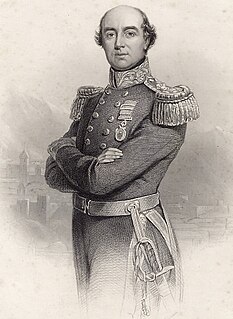
There have been twenty baronetcies created for persons with the surname Williams, eight in the Baronetage of England, three in the Baronetage of Great Britain and nine in the Baronetage of the United Kingdom. Only five of the creations are extant as of 2017..

The Blunt Baronetcy, of the City of London, is a title in the Baronetage of Great Britain. It was created on 17 June 1720 for John Blunt, the famous perpetrator of the South Sea Bubble, for his good work for the nation of Great Britain. He was a director of the South Sea Company. His great-grandson, the fourth Baronet, represented Lewes in the House of Commons from 1831 to 1840. His line of the family failed on the death of his son, the fifth Baronet, in 1847. The late Baronet was succeeded by his first cousin, the sixth Baronet. He was the son of Richard Charles Blunt, second son of the third Baronet. He died unmarried and was succeeded by his first cousin, the seventh Baronet. He was the son of William Blunt, third son of the third Baronet. He died childless and was succeeded by his younger brother, the eighth Baronet. He fought in the Indian Rebellion of 1857. The baronetcy descended in the direct line until the death of his grandson, the tenth Baronet, in 1969. He was succeeded by his younger brother, the eleventh Baronet. As of 2007 the title is held by the latter's son, the twelfth Baronet, who succeeded in 1975.
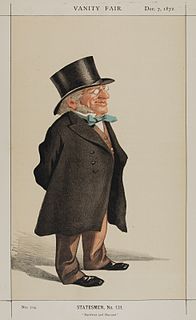
The Goldsmid Baronetcy, of St John's Lodge in the County of Surrey, was a title in the Baronetage of the United Kingdom. It was created on 15 October 1841 for Isaac Goldsmid, a financier and one of the leading figures in the Jewish emancipation in the United Kingdom. He was the first person of the Jewish faith to be created a baronet. He was succeeded by his son, the second Baronet. He was a barrister and sat as Member of Parliament for Reading. He was childless and was succeeded by his nephew, the third Baronet. He was a barrister, businessman and Liberal politician. Goldsmid had eight daughters but no sons and on his death in 1896 the title became extinct.
The Salomons, later Goldsmid-Stern-Salomons Baronetcy, of Broom Hill in the Parish of Tunbridge in the County of Kent and of Great Cumberland Place in the County of Middlesex, was a title in the Baronetage of the United Kingdom. It was created on 26 October 1869 for David Salomons, a leading figure in the 19th century struggle for Jewish emancipation in the United Kingdom, with remainder in default of male issue of his own to his nephew David Lionel Salomons and the heirs male of his body. Salomons died childless and was succeeded according to the special remainder by his nephew, the second Baronet. He was the son of Philip Salomons, younger brother of the first Baronet. The second Baronet married Laura, daughter of Hermann Stern, 1st Baron de Stern and Julia, daughter of Aaron Asher Goldsmid, brother of Sir Isaac Goldsmid, 1st Baronet. In 1899 he assumed the additional surnames of Goldsmid and Stern. The title became extinct on his death in 1925.
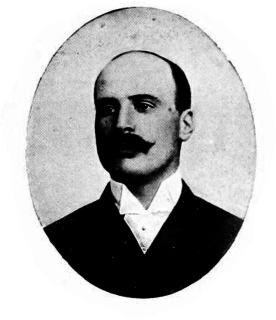
Sir Charles James Jessel, 1st Baronet DL, JP, was a British barrister, magistrate and businessman.
Colonel Herbert Merton Jessel, 1st Baron Jessel CB, CMG, TD, DL, JP, known as Sir Herbert Jessel, Bt, between 1917 and 1924, was a British soldier and Liberal Unionist, later Conservative politician.
Estelle d'Avigdor Nathan was an Austrian-British painter working in the latter years of the 19th century and the early part of the 20th.
Sir Osmond Elim d'Avigdor-Goldsmid, 1st Baronet was a British Baronet who served as High Sheriff of Kent in 1912, President of the Anglo-Jewish Association, President of the British Board of Deputies, Chairman of the Jewish Colonization Association, and Treasurer of the Jewish Memorial Council. Born Osmond d'Avigdor, he "added the name Goldsmid on inheriting the estates of his cousin Sir Julian Goldsmid". He was created a Baronet of Somerhill in the County of Kent on 22 January 1934.
References
- ↑ "No. 34018". The London Gazette . 26 January 1934. p. 604.